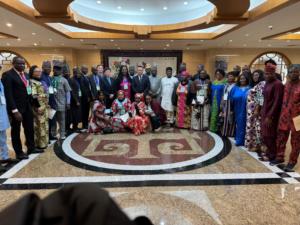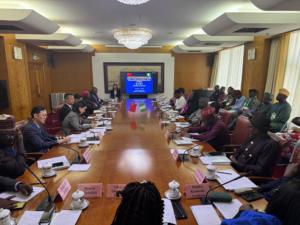Nigeria and China are actively deepening their partnership in economic development, which is characterized by a strong emphasis on the exchange of experiences and collaborative efforts across a variety of sectors, which are: Trade, Energy, Finance, Custom, agriculture, amongst others. Through this relationship, both countries are engaging in initiatives that foster sustainable growth, enhance capacity building, and promote investment opportunities.
Joint projects and programs are also being implemented to strengthen human capital and improve economic resilience, showcasing a shared commitment to addressing mutual challenges and achieving development goals. The Charge d Affaire, Embassy of Nigeria, Ambassador Baba Gana Wakil, made these known recently, while addressing participants at a 12-day Seminar on Xi Jinping: The Governance of China and Exchanges on the Experience in the Field of Economic Development between China and Nigeria, in Beijing, China.
The Seminar which was one of the outcomes of the Memorandum of Understanding (MOU) signed between the two countries during the September 2024, Beijing Summit, held in Beijing, China, was to enable participants engage in productive discussions, share valuable insights, and explore meaningful opportunities for cooperation.
I n his speech at the closing ceremony, Ambassador Wakil said “I am optimistic about the potential for Nigeria-China cooperation in promoting economic development. I believe that by working together, we can unlock significant opportunities that will lead to mutual benefits, including enhanced trade, increased investment, and sustainable economic growth for both countries. As this program comes to an end, let us reaffirm our commitments to strengthening Nigeria-China cooperation in economic development. Let us continue to collaborate, share knowledge, and explore opportunities for mutual growth, prosperity, and people-to-people cooperation”
n his speech at the closing ceremony, Ambassador Wakil said “I am optimistic about the potential for Nigeria-China cooperation in promoting economic development. I believe that by working together, we can unlock significant opportunities that will lead to mutual benefits, including enhanced trade, increased investment, and sustainable economic growth for both countries. As this program comes to an end, let us reaffirm our commitments to strengthening Nigeria-China cooperation in economic development. Let us continue to collaborate, share knowledge, and explore opportunities for mutual growth, prosperity, and people-to-people cooperation”
He commended the Embassy of Nigeria in China and the Federal Ministry of Budget and Economic Planning,for their support, which he said, was instrumental in driving the success of the program.The Ambassador, who was represented by the Senior Counsellor at the Embassy of Nigeria in Beijing, China, Mr. Ibrahim Jamilu Abdullahi, appreciated the Chinese partners: The Embassy of China in Nigeria, particularly, the National Development and Reform Commission (NDRC), for their support, which he said had greatly contributed to the positive experience of the delegation. In his words “We have gained a deeper understanding of each other’s economic development strategies, challenges, and successes”.
To the participants, drawn from: Federal Ministry of Budget and Economic Planning, the State House, Office of the Chief of Staff to the President, Industries Trade and Investment, Finance, Transport, Agriculture and Food Security, Marine and Blue Economy, the Nigeria Custom Service and other relevant Ministries, Departments and Agencies, Ambassador Wahil noted that their active engagement, thoughtful contributions, and steadfast commitments towards promoting economic development and strengthening cooperation between the two countries were invaluable to the success of the program.
Also speaking, the leader of the Delegation, from the Federal Ministry of Budget and Economic Planning, Mrs. Clementina Okoro noted “Over the course of this seminar, we have had the privilege of gaining first-hand insight into China’s extraordinary economic transformation and development strategies. We have explored key areas such as energy, infrastructure development, industrialization, innovation, and agriculture—fields where China has made tremendous strides. Most significantly, we have also learned about China’s experiences in poverty reduction, sustainable development, and its ambitious goals for the future”.
‘ Our time here in China has not only been a learning experience but a testament to the power of international collaboration. The discussions, workshops, and site visits have all contributed to a deeper understanding of the importance of strategic partnerships in fostering economic growth. We are reminded that no country can achieve sustainable development in isolation, and through mutual cooperation and shared knowledge, we can achieve greater success together’.
Our time here in China has not only been a learning experience but a testament to the power of international collaboration. The discussions, workshops, and site visits have all contributed to a deeper understanding of the importance of strategic partnerships in fostering economic growth. We are reminded that no country can achieve sustainable development in isolation, and through mutual cooperation and shared knowledge, we can achieve greater success together’.
“As we prepare to return to Nigeria, we are not only leaving with new knowledge, but with a renewed sense of purpose and determination to apply the lessons learned in our own work. The experiences shared during this seminar will undoubtedly guide us as we continue to chart a course for Nigeria’s own economic development especially in the energy sector where we explored various forms of energy (including renewable energy)”.
On behalf of all the Nigerian delegation, she appreciated their hosts: the NDRC, Energy Research Institute of China, Institute of China Development Planning, China Energy Engineering Group, Beijing Taiyangong Thermal Power Station, ZPMC, ECPR, Sinohydro Engineering Bureau & Co. Ltd. and all those who contributed to making the seminar an enriching and transformative experience, saying“The journey does not end here—it begins anew as we work together to shape a brighter future for both China and Nigeria as this seminar organized by the Chinese Government is a good strategy to deepen collaboration between the two countries”.
In his response, the Representative of the International Cooperation Department, National Development and Reform Commission, Mr. said he was elated to celebrate the outcome of the Seminar which he described as a very fruitful two -weeks’ outing. On behalf of NDRC, he expressed his gratitude to the Federal Ministry of Finance in Nigeria, the Embassy of Nigeria in China, all Agencies, Organizations and the personnel who offered great support for the success of the Seminar.
Papers presented at the Seminar were as follows: The Significance and Contemporary Value of Chinese Modernization, Insights on Xi Jinping’s Thought on Economy, China’s Foreign Opening -Up Strategy and Policies Towards Nigeria, Progress in the Belt and Road Initiative and Opportunities for China-Nigeria Cooperation, China’s Green and Low-Carbon Policy Framework, Overview of China’s National Condition’s, among others.
Imaobong Udoh
Information Unit,(FMBEP)
16/12/24.
